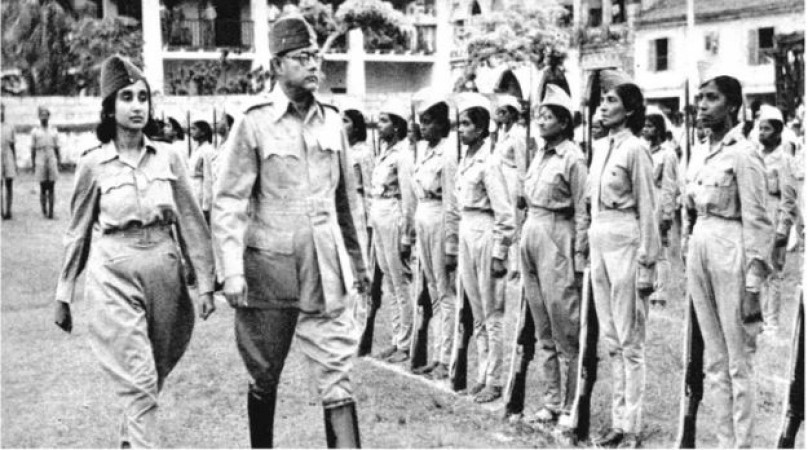
New Delhi: On this day, death anniversary of a significant historical man Netaji Subhas Chandra Bose, we reflect on the formation of India's first government. Back in 1943, precisely on October 21, a towering figure in Indian history, Netaji Subhas Chandra Bose, proclaimed the establishment of the 'Arzi Hukumat-e-Azad Hind' or the provisional government of Free India in Singapore. With this declaration, he also declared war against the British Empire.
Subhas Chandra Bose initiated a valiant struggle to liberate India from the clutches of British colonial rule. During the latter stages of World War II, he boldly formed a provisional government-in-exile. Bose firmly believed that armed resistance was the path to secure independence for the nation. His leadership resonated deeply with Indians, uniting not only thousands of soldiers but also former prisoners and expatriates residing in Malaysia and Burma. Under this provisional Government, Bose held multiple roles – Head of State, Prime Minister, and Minister of War. Captain Lakshmi led the women's organization, while SA Ayer directed the publicity wing. The guidance of revolutionary leader Ras Behari Bose as supreme adviser added strategic wisdom. Supported by Axis powers including Imperial Japan, Nazi Germany, the Italian Social Republic, and their allies, the government took shape.
The origins of this initiative were rooted in Subhas Chandra Bose's overseas struggle for India's freedom. The outbreak of World War II provided a strategic window for Bose to strike against the British imperialists. Despite being placed under house arrest in 1940, he managed a daring escape to Berlin on March 28, 1941. In Germany, the Indian community played a pivotal role in establishing the Indian Independence League in 1942. This league would ultimately pave the way for the formation of the Indian National Army (INA), envisioned as a force for India's liberation.
June 13, 1943, marked a critical juncture when Bose arrived in Singapore, responding to an invitation from Ras Bihari Bose. He took on leadership roles in both the Indian Independence League and as the head of the INA, known as 'Azad Hind Fauj.' With his iconic battle cry 'Chalo Dilli,' Bose kindled hope, promising Indians, "Tum mujhe khoon do, main tumhe Azadi dunga" (You give me blood, I will give you freedom). The significance of the Azad Hind government was substantial. Swiftly after its formation, it asserted authority over Indian civilian and military personnel within Southeast Asian British colonial territories. Moreover, it anticipated authority over Indian territories that might come under Japanese forces or the Indian National Army during World War II.
The provisional government offered Bose an avenue for equal negotiation with the Japanese and facilitated the mobilization of Indians in East Asia to join and support the INA. This armed force, the Azad Hind Fauj, played a pivotal role in bolstering India's fight for independence, offering a much-needed impetus. Remarkably, the Azad Hind government initiated its own bank, currency, civil code, and postage stamps. Bose's progressive approach extended to the establishment of the INA's first women's regiment, the Rani Jhansi Regiment, a pioneering step toward gender equality in the armed forces.
With its establishment, the Azad Hind Government declared war against the British and their allies on the Indo-Burma Front. The Azad Hind Fauj engaged in fierce battles, facing the British Indian Army and allied forces as part of the Imperial Japanese Army in the Imphal-Kohima sector. The existence of the Azad Hind Government lent heightened legitimacy to India's struggle against British rule. Subhas Chandra Bose's courageous actions, and his bold decision to establish the nation's inaugural government, catalyzed a series of events that eventually compelled the British government to relinquish its hold over India in August 1947.
The actions set into motion by the INA and the Azad Hind Government proved pivotal in shaping the trajectory toward India's independence. Historical records, including accounts from provincial governors and the Intelligence Bureau, attest to the growing popularity of Subhas Chandra Bose and the sympathetic support for the INA by the mid-1940s. The seismic impact of Bose's heroism triggered a naval mutiny in Bombay and other stations, as well as rebellions in various army camps, including Madras and Poona. The British government's subsequent actions, including the court-martial of INA officers and soldiers, fueled nationwide outrage. An Intelligence Bureau report from November 1945 warned that the sentiment in support of INA soldiers could lead to mass agitation and bloodshed if not addressed.
The resonance of Indians with the INA was evident as governors, out of concern and apprehension, sent letters to Viceroy Lord Wavell, cautioning against targeting the INA. They highlighted the INA's role as valiant freedom fighters and warned of potential mutinies within the Indian Army if such actions continued. The events took a decisive turn in 1946 with the Indian officers' mutiny in the Royal Indian Navy and rebellions against British rule in various cities. These actions underscored that the British could no longer rely on the Indian armed forces to uphold their interests. The Indian personnel within the Royal Indian Navy were well-informed about global developments and extended their support to the INA.
As the British government recognized the diminishing viability of continued rule, they hastened their efforts to conclude their governance in India. The brave struggles of the INA and the Azad Hind Government, led by Subhas Chandra Bose, cast a spotlight on the inevitable tide of change, compelling the British to relinquish their control over the subcontinent. As we commemorate Subhas Chandra Bose's death anniversary, his indomitable spirit and the pivotal role of the Azad Hind Government in India's fight for independence remain etched in history. The legacy of his leadership continues to inspire generations, underscoring the power of unity, determination, and the unwavering pursuit of freedom.
Urgent Collaboration Needed for Digital Security: Minister Vaishnaw
Rainy Day Cravings: 5 Tempting Snacks for Monsoon Evenings
Claim Your Forgotten Deposits with RBI's Innovative UDGAM Portal